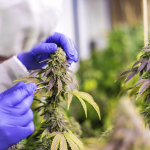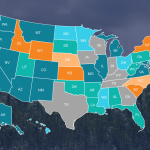Veterans are at an increased risk for depression, PTSD, and opioid dependency caused by the treatment of chronic pain. Although research into marijuana use for the treatment of these conditions has been promising, under federal law, veterans are currently not allowed to use or possess medical-use or adult-use marijuana, even if it’s legal in their state. Fortunately, in response to overwhelming support, there is new legislation on the horizon that may create a pathway for access in the future.
Upcoming Legislation
Where previous bills have failed, many are optimistic that the bipartisan Veterans Medical Marijuana Safe Harbor Act will pass in this session and expand access to medical marijuana to veterans.
If passed, the bill proposes to:
- Allow veterans to legally possess and use marijuana under a recommendation from their doctor.
- Allow physicians with the US Department of Veterans Affairs (VA) to recommend marijuana for veterans.
- Require the VA to study the therapeutic potential of medical marijuana, specifically for reducing pain and opioid misuse.
- Put aside $15 million for the VA to administer the policy changes.
The bill will only be valid for five years before it will need to be renewed by congress. But with the tremendous support from multiple veteran associations and high-profile politicians, renewal should hopefully not be an issue.
Additionally, the passage of the VA Medical Cannabis Research Act would require the VA secretary to carry out a series of clinical trials on the effects of medical-grade marijuana on the health outcomes of veterans diagnosed with chronic pain and post-traumatic stress disorder.
Current Status
Though medical marijuana is legal in 36 states and 83% of veterans support medical marijuana programs, zero VA facilities provide it. VA physicians are prohibited under federal law from recommending marijuana for veterans. This prevents veterans from receiving potentially beneficial treatment or forces them to seek the advice of costly, out-of-network physicians.
Despite current restrictions, there are a substantial number of veterans already using marijuana. A poll from the American Legion showed that 1 in 4 veterans self-reported using marijuana to alleviate a condition while 4 in 10 people say they know a veteran who uses marijuana medicinally.
Benefits of Legalizing Medical Marijuana
Marijuana is recognized by the American College of Physicians, the American Public Health Association, and the American Nurses Association as a safer alternative to many legal treatments. It is also free from the devastating addictive properties and side effects of opiates.
Recently, studies have suggested that marijuana could temporarily alleviate PTSD symptoms. Scientists believe PTSD symptoms are due to a reduction in the amygdala, a part of the brain associated with fear responses to perceived threats. Randomized studies from Wayne State University in Detroit found that THC lowered threat-related amygdala activity in people with PTSD, suggesting they experienced less anxiety and fear.
As legalization spreads, more expansive research into the benefits of medical marijuana will be conducted. With national support for marijuana for veterans, it is possible that a change in federal law is coming soon.
How Can Sapphire Risk Help?
- First Experiences: What Our Interns Learned From Entering The Cannabis Industry

- California Senate Bill 69 Adds CEQA Requirements for New Cultivators

- Top 5 Cannabis Security and Surveillance Violations

- Peace of Mind in the Retail Sector: Facility Security

- Opportunities in the Ohio (O-High-O) Cannabis Market

- Building Security and Trust: Verifying Identification and Payments

- The Importance of Loss Prevention

- Thoughts to Improve Cannabis Security Regulations Across the Nation

- Opportunities in the Minnesota Cannabis Market

- U.S. Cannabis Legalization 2023 Update


